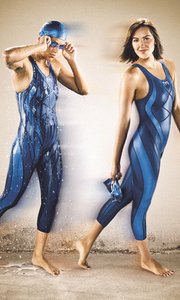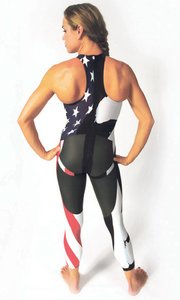Tyr, Speedo Lawsuit Treads Water During Olympics
While the world’s best athletes compete in Beijing, two leading swimwear makers that outfit Olympians will take a break from their battle.
Any legal hearings on the lawsuit filed by Huntington Beach, Calif.–based Tyr Sport Inc. against rival Speedo USA and parent Warnaco Swimwear Inc. in U.S. District Court in Los Angeles were postponed until Sept. 15.
Tyr is seeking unspecified damages from Speedo as well as from Colorado Springs, Colo.–based USA Swimming and U.S. national coach Mark Schubert, charging them with violating several trade acts as well as committing trade libel, interference and unfair business practices.
Part of the case stems from the high-tech swimsuits the companies produce, both of which claim to help swimmers trim up to 2 percent to 4 percent off their best times. Speedo this year introduced the LZR Racer, a skin-tight body suit that was engineered with the help of the National Aeronautics and Space Administration (NASA). Speedo swimmers have broken 38 world records since the suit was launched in February.
Tyr produces a similar suit called the Tracer, which the company claims is the first woven polyurethane-based suit used in world-class competition. Tyr athletes have produced 32 personal-best times, including a world record and several U.S. records. Four Tyr-sponsored athletes are competing in Beijing.
Tyr executives claim the company has been locked out of endorsement and promotional opportunities and charge Speedo-backed coach Schubert of using his authority to lure athletes away from companies such as Tyr.
“Schubert has gone so far as to state that Olympic-hopeful swimmers who do not switch to Speedo are wearing inferior equipment and are at risk of staying home during the Beijing Olympic Games because of the inferiority of their equipment,” the lawsuit said.
Tyr is including USA Swimming in the suit for not doing anything to halt Schubert’s actions.
The lawsuit also is charging former Tyr endorser Erik Vendt with breach of contract after he jumped ship, informing the company that he would be wearing the Speedo suit at a competition in Long Beach, Calif., last January. After failing to qualify for the U.S. team in his main events, Vendt filed a counterclaim against Tyr, saying the lawsuit inhibited his training and concentration and that his contract allowed him to wear a competitor’s suit if Tyr did not produce a comparable one.
At stake are millions of dollars’ worth of exposure that the Olympics bring. The high-tech swimsuits also stand to make a lot of money for Tyr and Speedo when they are released to retailers later in the year. The Speedo suit’s suggested retail price is $550.
Beaverton, Ore.–based Nike Inc. also produces a body suit, called the Swift, but the company is taking a different stance on the situation by allowing several of its athletes to wear the Speedo suit in Beijing. Nike spokesperson Dean Stoyer said Nike felt it was more important for athletes to put their performance and focus ahead of what they wear.
Some of the Italian swim coaches, on the other hand, were against the body suits all together, calling it “technological doping.”
“Warnaco [Speedo] has learned that Tyr has filed a lawsuit against it and others. While Warnaco generally does not comment on pending litigation, we think this lawsuit is without merit,” said a statement from Warnaco’s legal department. “Speedo, for 80 years, has been the leader in innovation. Speedo’s goal has always been to help athletes achieve their personal best. We’re pleased that swimmers wearing Speedo LZR Racer have set 37 world records in the last three months. The case is on hold until mid-September so all the athletes and everyone concerned can focus their energies on the Olympic competition.” —Robert McAllister























